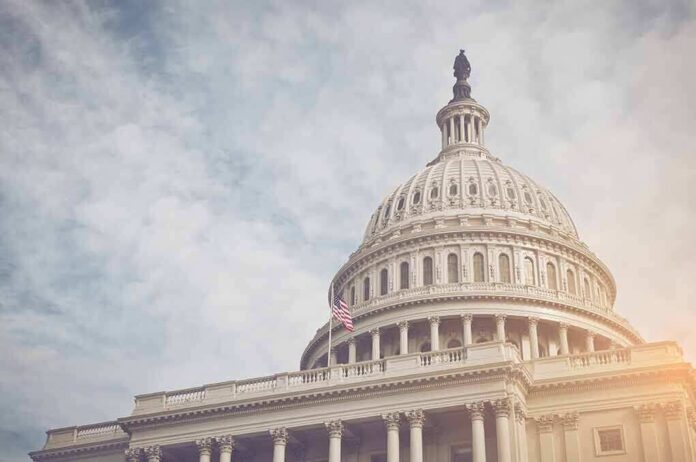
The House has introduced a reconciliation bill with significant implications for Medicaid, gender transition funding, and climate policy adjustments, leaving many eager to understand its far-reaching consequences.
Quick Takes
- The House reconciliation bill targets $880 billion in spending cuts, impacting Medicaid and climate funding.
- New eligibility checks and work requirements might affect millions of Medicaid recipients.
- Federal support for undocumented immigrants and gender transition procedures will face new funding restrictions.
- The bill aims to rescind funds linked to Biden’s climate initiatives under the Inflation Reduction Act.
Medicaid Adjustments and Work Requirements
In an effort led by Rep. Brett Guthrie, the House Energy and Commerce Committee has proposed changes affecting Medicaid. The proposed legislation includes imposing work requirements on adults without dependents to maintain coverage. It also seeks to implement eligibility checks every six months for Medicaid recipients. The bill prioritizes cost-cutting while maintaining exemptions for populations like minors and pregnant women.
Committee members estimate the reconciliation bill could save over the initial $880 billion target, achieved through targeted reductions, avoiding politically sensitive Medicaid cuts. However, the Congressional Budget Office estimates that as many as 8.6 million people could lose health insurance under the proposed legislation.
Gender Transition Funding and Abortion Services
The legislation includes a ban on Medicaid funding for gender transition procedures in minors, reflecting the GOP’s stance on this controversial issue. The proposal also restricts Medicaid’s financial support for organizations providing abortions beyond exceptions set by the Hyde Amendment, targeting those receiving over $1 million in Medicaid payments.
This aspect of the bill has faced criticism, with detractors suggesting that such measures are driven by ideological motives rather than practical concerns. As the bill progresses, it serves to heighten already existing tensions surrounding healthcare policy.
Implications for Immigration and Climate Policy
House Republicans aim to reduce federal funds for undocumented immigrants by reinforcing legal status verifications. Medicaid benefits will require citizenship proof to maintain coverage, curtailing benefits that some see as unnecessarily extended to illegal immigrants. These measures reflect the broader context of the proposed legislation’s focus on reducing federal assistance in various domains.
This reconciliation bill will also rescind grants and unused funds connected to Biden administration climate initiatives, particularly those linked to the Inflation Reduction Act. The GOP aims to repeal energy subsidies, further complicating previously established climate policies.
My friend, @RepGuthrie, is leading the charge to pass President Trump’s agenda in the House. From today’s @wsj, he lays it out – Republicans are working to save Medicaid, cut taxes, and restore common sense, just as the President laid out in his inaugural. 🇺🇸🇺🇸🇺🇸 pic.twitter.com/cprPCbLkeA
— Scott Jennings (@ScottJenningsKY) May 12, 2025
Sources:
- House GOP releases reconciliation bill to cut Medicaid funding
- Republicans Make Big Medicaid Cuts in Their Reconciliation Bill — But Not the Ones Conservatives Wanted
- ‘Under Cover of Night,’ GOP Unveils Plan to Kick Over 8 Million Off Medicaid | Common Dreams
- EXCLUSIVE: Inside the $880 Billion Republican Plan for Medicaid Overhaul












